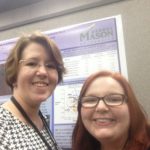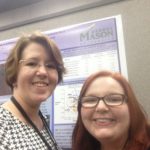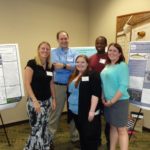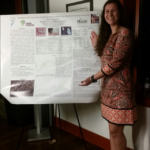BY: CJ Carroll Schlick
As the past student representative for the Atlantic Estuarine Research Society and student member to several other organizations, I think it is extremely important for both undergraduate and graduate students to attend local and national conferences. I have participated in about 6 national and 10 regional conferences during my time as a graduate student. My conference participation has helped to enhance my CV and more importantly, it has helped to hone my abilities to communicate science to a broad audience. To that end, I am always surprised when I meet students who have never been to a conference or have never considered going. Below, I share the benefits I have received from attending professional scientific meetings and hope to encourage other students to do the same.
Networking
When people think of conferences, they are usually aware of the networking potential. You can have conversations with professionals you have never met before. Most students are intimidated by this concept but shouldn’t be. Conferences are designed for networking with researchers in your area of interest and most attendees seek out opportunities to engage with students. Students are not seen as “newbies” who only attend meetings to learn. We will soon be or already are contributing to our respective fields of study and engaging with established scientists earlier in our careers provides the potential for years of collaboration. Professionals who attend the conference can tell you their story, for instance sharing what attributes helped their career (or adventures they would recommend not repeating). Attending conferences allowed me to network outside of the “academy,” to collaborate on projects through organizations not affiliated with a university. Networking also informed me of what other career opportunities were available, since I recently decided that I did not want to pursue a career in academia. Through this process and exploration, I could then direct my focus on scientists who were currently working outside of the university setting. I recently networked at a conference with an environmental consultant and this relationship has provided a new outlet of knowledge that I can tap into. Effective networking takes time to develop but is one of the most useful things you can do as a new or even seasoned student. So my advice: Start networking early and often. Build relationships and don’t be afraid to be your own advocate.
New Point of View
So you want to attend a conference and you don’t have any results or your results are confusing or your methods aren’t working….Sound familiar? I have been there! And actually, this point is the best time to attend a conference. Many students believe they must have a finished product to present, but then they graduate and never present the work (or only attend one conference). Preliminary results and proposed projects are acceptable presentations at a conference. I personally use poster presentations for my proposed projects because you have more time to discuss the project with interested attendees. The goal here would be to discuss problems/road blocks you are having with your study while presenting your poster. If someone is interested in your work, they may have a new point of view that will help catapult you into the next phase of your work. Also, if you plan on pursuing another degree, you will meet other professors in your area of interest that could potentially be your next advisor or supervisor. My advice: Present your research or your research plan even if you haven’t started it! Talking about your current work or proposed work is the best way to expand your breadth of knowledge.
Maximize Your Experience
GET INVOLVED!! Just attending a conference can change your work, perspective, and career but you are still missing a lot of what conferences and scientific societies have to offer. Meet with your society’s student representative to ask how you can be involved or to offer an idea of something you wished the conference provided (trust me student representatives are always looking for ideas for workshops and luncheons). You could also approach other board and committee members at the society and ask them how to help. Program committees, social event coordinators, membership committees, website/media committees are a few examples where help is often needed. Many positions on society boards are voluntary, with the individuals working full time somewhere else, so help is readily accepted. Many of these volunteer activities do not take more than a few hours a semester (and they can help enhance your CV). Additionally, working as a volunteer increases your exposure (increases your networking) and can have a huge payoff (especially if you are shy and need help getting outside your comfort zone). For example, if you want to meet a profound leader in your field but you are too scared to introduce yourself, you can use your position within the society as a jumping off point to start a conversation. In addition, if you are volunteering for a board member, for instance, they could (and most likely would enjoy) introducing you to said person, thus reducing the stress of the experience. My advice: Volunteer to help the society or conference organizers and use that position as a platform to develop a sense of confidence to meet new scientists in your field.
Cheap Workshops on Valuable Tools
Workshops and fieldtrips are an added advantage to most scientific conferences. They will usually take place a few hours to a day before the conference begins. Many are free or a low attendance fee is added (I’ve paid up to $140 but that is unusual). Workshops that are offered vary widely between topics. More generalized conferences have a wider range of options. For example, at the last Coastal & Estuarine Research Federation (CERF) in Portland, Oregon, workshops covered topics like “Social Media and Science”, “The Academic Job Search: From A to Z”, and “Tutorial on Scientific Writing and Publishing.” However, more specialized conferences may offer more specialized workshops, like the past American Fisheries Society (AFS) conference in Portland, Oregon offered workshops on “Beginning/Intermediate GIS for Fisheries Scientists,” “Analyzing Fish Diets to Assess Trophic Status,” and “Age and Growth Analyses with R.” Regardless of the specialization of the workshops, these opportunities provide a resource at a reduced price that may not be available through other means. For example, I participated in the AFS “Age and Growth Analyses with R” workshop and learned information pertinent to my dissertation. Learning these procedures through other means could have included teaching myself (a long arduous task), taking a class (or two) that would have cost several hundred dollars in tuition, or more than likely a combination of the two. Moreover, some topics covered in workshops are not even available through at the university level. I participated in the CERF “The Academic Job Search: From A to Z,” which provided valuable insight into preparing to apply for jobs in academia (this was obviously before I decided that academia wasn’t for me). This information is not traditionally taught to students, making this workshop important to someone who is about to go on the job market. So my advice: When you are preparing to attend a professional meeting, make sure you research what workshop and field trip opportunities that are available at the conference.
Remember Funding!
Even though the registration for students is usually reduced at professional conferences, finding the funds for all the other expenses can be a challenge. Between transportation, hotels, registration, and food, a conference can be cost prohibitive. But don’t fret! Many societies offer ways to help students attend a conference. Some offer student travel grants, while others offer to reimburse registration if the students work at the conference. These opportunities will usually be listed on the society’s webpage and/or sent out on a list serve to members (good reason to be a member). Both opportunities can help defray costs of the conference and travel awards can certainly be added to your CV! Additionally, you are usually recognized at the conference, further increasing your networking opportunities. Students receiving travel awards are usually presented with the awards at the business meeting, putting you face to face with the board of the society. Student volunteers are presented with t-shirts, acknowledging they are able to help attendees with questions or directions. Both opportunities increase your exposure at the conference and give you reasons to speak with attendees around you. My advice: Apply for any and all grants and awards offered by a conference. Volunteer if that waives your registration fee. Also, check with your department, student organization or college to see if they offer travel grants.
Conferences are exciting networking opportunities designed to share current research, ideas, and questions throughout the scientific community. Most societies, professors, managers, and schools encourage student participation. You just have to be willing to get out there and immerse yourself. Become a member of scientific societies and organizations to enjoy all of the benefits of being a part of that community. Many groups provide job list serves, funding opportunities, research spotlights, and member directories (showing who is also participating, giving you a way to introduce yourself). Science is a field that is dictated by communication and conferences are a primary tool that can easily be mastered early in your career. Take advantage of it!



